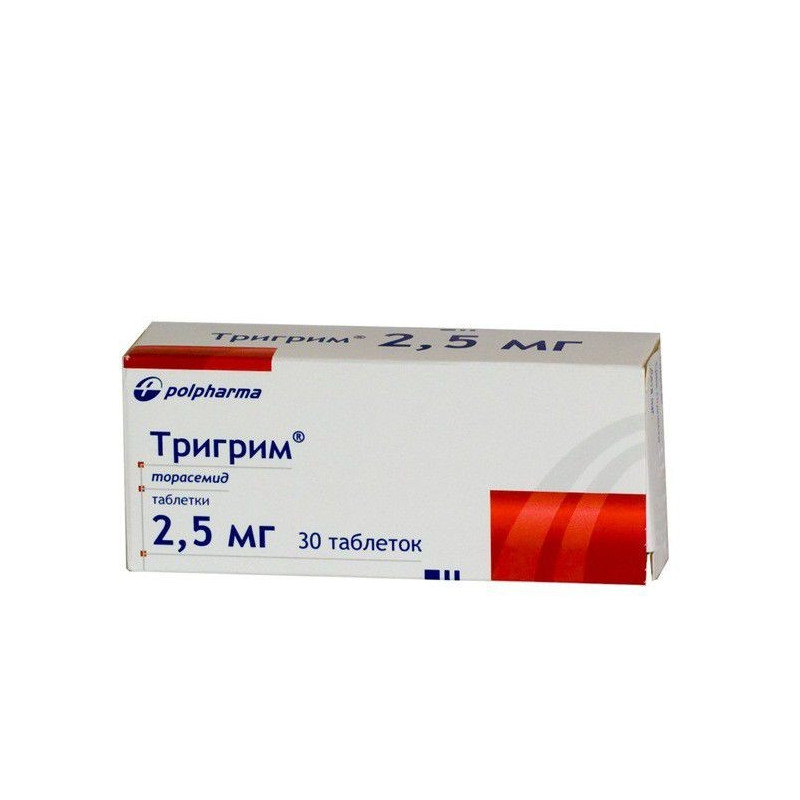



 All payments are encrypted via SSL
All payments are encrypted via SSL
 Full Refund if you haven't received your order
Full Refund if you haven't received your order
- swelling caused by heart failure, diseases of the liver, kidneys and lungs;
- primary arterial hypertension (used as monotherapy or in combination with other antihypertensive drugs).
- anuria;
- hepatic coma and precomatose state;
- chronic renal failure with increasing azotemia;
- arrhythmia;
- arterial hypotension;
- pregnancy;
- lactation period (no data on the use during lactation);
- age up to 18 years (efficiency and safety have not been established);
- Hypersensitivity to Torsemide and sulfonamides.
The drug should be used with caution in patients with diabetes mellitus, gout, water-electrolyte imbalance, liver dysfunction, liver cirrhosis, and a predisposition to hyperuricemia.
The drug is prescribed for adults, by mouth, regardless of the meal.
When edema drug prescribed in a dose of 5 mg 1 time / day. If necessary, the dose can be gradually increased to 20 mg 1 time / day. In some cases, it is recommended to use up to 40 mg / day.
For edema associated with congestive heart failure, it is prescribed at a dose of 5-20 mg 1 time / day. If necessary, the daily dose can be gradually increased, doubling it to a maximum of 200 mg.
For edema associated with chronic renal failure, the initial dose is 20 mg / day. If necessary, this dose can be gradually increased, doubling it, until optimal diuretic action is achieved. The maximum daily dose is 200 mg.
For edema associated with cirrhosis, the drug is prescribed in a dose of 5-10 mg 1 time / day. If necessary, this dose can be gradually increased, doubling it, until a corresponding diuretic effect is achieved. No properly controlled studies have been conducted in patients with liver disease using doses of more than 40 mg / day.
With primary hypertension, the dose is 2.5 mg 1 time / day. If necessary, the dose can be gradually increased to 5 mg / day. According to research, a dose of more than 5 mg / day does not lead to a further reduction in blood pressure. The maximum effect is achieved after about 12 weeks of continuous treatment.
Elderly patients do not require dose adjustment.
Hemic and lymphatic: in some cases, a decrease in the number of erythrocytes and leukocytes, as well as platelets.
Metabolism: in some cases - hypovolemia, electrolyte imbalance, hypokalemia, elevated serum uric acid, glucose and lipids.
Cardiovascular: in some cases - circulatory disorders and thromboembolism (due to dehydration), a decrease in blood pressure.
Gastrointestinal: symptoms of gastrointestinal dysfunction, loss of appetite, dry mouth; in some cases - increased activity of liver enzymes (including GGT), pancreatitis.
Urogenital: acute urinary retention, increased urea and plasma creatinine levels.
Nervous system: headache, dizziness, weakness, drowsiness, confusion, convulsions, paresthesias in the limbs.
Special senses: visual disturbances, tinnitus, deafness.
Allergic reactions: pruritus, rashes and photosensitivity.
Symptoms: there is no typical picture of poisoning; in overdose, increased diuresis is observed, accompanied by hypovolemia, electrolyte imbalance, followed by a fall in blood pressure, drowsiness, confusion, collapse, and gastrointestinal disturbances are possible.
Treatment: conducting symptomatic therapy — reducing the dose or eliminating the drug while simultaneously completing the loss of fluid and electrolytes. The specific antidote is unknown.
At a temperature not higher than 25 ° С.
Trigrim